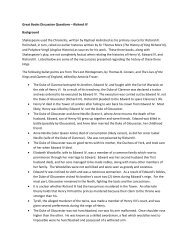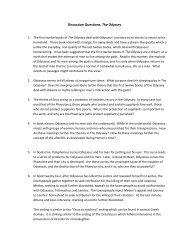1 Wordsworth's Literary Precedents: Derivation and ... - Peter Ponzio
1 Wordsworth's Literary Precedents: Derivation and ... - Peter Ponzio
1 Wordsworth's Literary Precedents: Derivation and ... - Peter Ponzio
You also want an ePaper? Increase the reach of your titles
YUMPU automatically turns print PDFs into web optimized ePapers that Google loves.
The thought suggested itself (to which of us I do not recollect) that a series of<br />
poems might be composed of two sorts. In the one, the incidents <strong>and</strong> agents were<br />
to be, in part at least, supernatural; <strong>and</strong> the excellence aimed at was to consist in<br />
the interesting of the affections by the dramatic truth of such emotions, as would<br />
naturally accompany such situations, supposing them real. (524-5)<br />
In the preceding paragraph, we are made aware of the general format of the work,<br />
where Coleridge was to write about supernatural subjects with the intent of making them<br />
seem real. Coleridge elaborates on Wordsworth’s contribution to the work by saying that<br />
“For the second class, subjects were to be chosen from ordinary life; the characters <strong>and</strong><br />
incidents were to be such, as will be found in every village <strong>and</strong> its vicinity, where there is<br />
a meditative <strong>and</strong> feeling mind to seek after them, or to notice them, when they present<br />
themselves”(517).<br />
Not only does Coleridge mention the framework of the Lyrical Ballads in these<br />
excerpts, he also introduces the theme of the “modifying colors of the imagination.” For<br />
Coleridge, like Wordsworth, the imagination combines elements of the poet’s senses with<br />
the cognitive powers of the mind to transform a sensory object into poetry. Coleridge<br />
describes this transformative power of the imagination in great detail.<br />
The poet, described in ideal perfection, brings the whole soul of man into activity,<br />
with the subordination of its faculties to each other, according to their relative<br />
worth <strong>and</strong> dignity. He diffuses a tone <strong>and</strong> spirit of unity, that blends, <strong>and</strong> (as it<br />
were) fuses, each into each by that synthetic <strong>and</strong> magical power, to which we<br />
have exclusively appropriated the name of imagination. This power, first put in<br />
action by the will <strong>and</strong> underst<strong>and</strong>ing, <strong>and</strong> retained under their irremissive, though<br />
gentle <strong>and</strong> unnoticed, control (laxis effertur hebenis) reveals itself in the balance<br />
or reconciliation of opposite or discordant qualities: of sameness, with difference;<br />
of the general, with the concrete; the idea, with the image; the individual with the<br />
representative; the sense of novelty <strong>and</strong> freshness, with old <strong>and</strong> familiar objects; a<br />
more than usual state of emotion, with more than usual order; judgment ever<br />
awake <strong>and</strong> steady self-possession, with enthusiasm <strong>and</strong> feeling profound or<br />
vehement; <strong>and</strong> while it blends <strong>and</strong> harmonizes the natural <strong>and</strong> the artificial, still<br />
subordinates art to nature; the manner to the matter; <strong>and</strong> our admiration of the<br />
poet to our sympathy with the poetry. (524-5) (Italics mine)<br />
6




